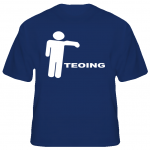As we move education into a realm that makes greater use of online learning and we ponder how we award traditional course credit for courses taken in the MOOC model, an important consideration is our ability to verify that the person receiving the credit truly is the person doing the work. An obvious advantage that the traditional face-to-face education model ... Read More »
Category Archives: Higher Ed
Feed SubscriptionObservations on Online Experiential Learning
The following are excerpts from a paper I’ve been writing with my colleague Anne Hammer at the Northeastern College of Professional Studies (CPS). Experiential education is a holistic philosophy with carefully chosen experiences supported by reflection, critical analysis and syntheses. In more simplistic terms, experiences are structured to require the learner to take initiative, make decisions and be accountable for ... Read More »
Self-motivating assignments
This post isn’t about grading, but I have to tell you: Grading is the bane of my existence. There, I’ve said it—publicly—and it feels good. If I could discover how to teach without all the grading, my outlook would skyrocket. One of the biggest reasons I feel this way is because grading 20 versions of the same assignment is, well, ... Read More »
Before the Web: the Dawn of Distance Education
We tend to think of online education as a modern phenomenon—one that’s directly tied to today’s technology-based world. (And one which offers a range of benefits—some unexpected, as Art LaMan observed here.) But online education is just the latest form of distance education, a phenomenon that actually dates back to long before personal computers and mobile devices became staples of ... Read More »
Experiential learning for online, working professionals: a pilot program
Have you ever thought about what portion of your job you learned “informally” versus “formally”? You’ll probably be impressed (with yourself) when you realize that most of what you learned at your job was self-taught. You might even think, “my employer is lucky I’m so resourceful and smart and can figure out what I am doing on my own. In ... Read More »
Online Education Partners: Why Does a University Need One—and How Do You Choose?
Depending on who you talk to, online education is either the big man on campus (BMOC, for the acronym-minded) or the elephant in the classroom. Colleges and universities are launching new or expanded online programs for a multitude of worthwhile—and sometimes hotly debated—reasons, but the basics come down to these: to attract new students, boost enrollments, diversify student populations and ... Read More »
Measuring and understanding the true impact of community colleges
Several recent reports have been alarming those of us in higher education who care deeply about the future of community colleges and those who attend them. One is Bridging the Higher Education Divide: Strengthening Community Colleges and Restoring the American Dream, a new report from the Century Foundation task force on “preventing community colleges from becoming separate and unequal.” Some ... Read More »
5 tips for adults thinking of going back to school
Are you thinking of heading back to school? If so, it wouldn’t just be you and Rodney Dangerfield there. The latest research shows that adults are heading back to college in higher numbers than ever. And with grim projections of employability shortfalls looming in the not-very-distant future, adding some academic feathers to your cap makes more and more sense with every hotly sought-after ... Read More »
Death to the College Credit
In my experience in higher ed, I’ve learned this rule: Governance is impervious to being fixed. Somehow it works, and no degree of AAU guidance will make it uniform, or even rational. And a university’s governance works only at that university; whereas one school takes 12 minutes to approve a new concept, another may take 12 years. In general, though, ... Read More »
So Close, Yet So Far: Ambition and Expense Collide as Minority Students Seek Higher Education
Minority students face a number of challenges as they enter higher education (including entering it, as this recent New York Times item highlights)—not the least of which are the economic hurdles. Two recent articles focus on the uphill battle faced by minority students as they engage with higher education—from weighing the decision to apply, to enrolling and matriculating, to successfully ... Read More »










